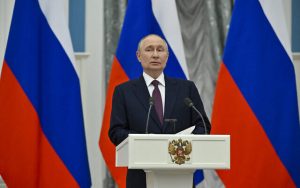Zoé Tkaczyk
Impunity Watch News Guest Writer
THE HAGUE, Netherlands – Since March of 2023, the ICC has sought to arrest Russian President Vladimir Putin and the Commissioner for Children’s Rights, Ms. Maria Lvova-Belova. However, as Russia is not an ICC signatory, it is unlikely that Putin or Lvova-Belova will be extradited for trial soon.
 |
Both are allegedly responsible for war crimes related to unlawful deportation and transportation of population, specifically children, from Russian-occupied areas of Ukraine as far back as 2022 in violation of Rome Statute Articles 8(2)(a)(vii) and 8(2)(b)(viii). Incidents identified by the prosecutor’s office include deporting children removed from orphanages and child care homes. Many of these children were allegedly given up for adoption in the Russian Federation, and Russian law was changed via presidential decree to expedite citizenship. These acts demonstrate an intention to remove these children from their home country permanently, which violates the Fourth Geneva Convention. Moscow has denied the allegations and called the warrants outrageous.
Pre-Trial Chamber II considered, based on the Prosecution’s applications in February 2023, that there were reasonable grounds to that each suspect may bear responsibility for the unlawful deportation of population and the unlawful transfer of population from occupied areas of Ukraine to the Russian Federation, particularly in prejudice of Ukrainian children. The Court had evidence of individual criminal responsibility for both under Article 25(3)(a) of the Rome Statute and against Putin for failure to properly control civilian and military subordinates under Article 28(b). The warrants were considered in secret to protect the witnesses and investigation.
Prosecuting a military mastermind is no easy task and could undermine the Court; however, as the crimes addressed are allegedly ongoing, there is some hope that despite the unlikelihood of extradition, public awareness of the warrants may prevent further crimes. The Chamber considered this to be in the interest of justice and allowed the Registry to publicize the warrants’ existence, the suspect’s names, the warrants’ crimes, and the modes of liability the Chamber established.
The UN Commission of Inquiry of Ukraine found that Russian authorities took over 16,200 children out of Ukraine into Russia. The same Commission found evidence of rapes, torture, and killings, and has been investigating as far back as 2013 before the illegal annexation of Crimea. While the ICC can bring a prosecution against political leaders for waging an aggressive war, the Court seems to be focusing on civilian and children’s rights for now. Additionally, while the warrants recognize these acts as war crimes, commentators are making the case that the conduct also constitutes genocide and crimes against humanity. The decision to pursue these as war crimes may be an indication of evidence related to intent. With both the alleged crimes and evidence collection ongoing, the charges may be amended.
The Court has no power of enforcement instead relying on the 124 nations that are signatories to the Rome Statute to arrest those indicted of war crimes or crimes against humanity if they visit their territories. And yet, the Court issued the warrants. The decision to pursue charges against Putin sends a strong signal to low-level perpetrators that none are immune from prosecution and may serve as a deterrent. Plus, while Putin is not the first sitting head of state to be indicted, he is the first leader of a P5 country to be indicted. The ICC arrest warrants have impacted Putin internationally. He did not attend the BRICS summit in August 2023 in South Africa. Besides hindering potential international travel for Putin, the warrants make meeting with Putin less appealing. The stakes for engaging with Putin are becoming increasingly high for foreign governments. Combined with sanctions, the ICC warrants make it harder to ignore Russian actions in Ukraine and the brutality of its war. Even as many celebrate the ICC’s announcement, the Ukrainian government and like-minded partners continue to press for international support for the establishment of the tribunal to hold Russia accountable for the full breadth of crimes committed, specifically the crime of aggression.
This article is one of a seven-part series exploring the Russo-Ukrainian War. Zoé Tkaczyk is a J.D./MAIR candidate (May 2025) at the Syracuse University College of Law and Maxwell School of Citizenship and Public Affairs. This article series was inspired by sessions from the Carnegie-Maxwell Policy Planning Lab Fellowship: Postwar: Europe, Ukraine and the Future of European Order. Special thanks to Cora True-Frost and Alexa Connaughton for their guidance, feedback, and edits.
International Crisis Group – A New Court to Prosecute Russia’s Illegal War? – 29 March 2023
BBC News – What is a war crime and could Putin be prosecuted over Ukraine? – 20 July 2023
Foreign Affairs – Would Prosecuting Russia Prolong the War in Ukraine? – 12 July 2023